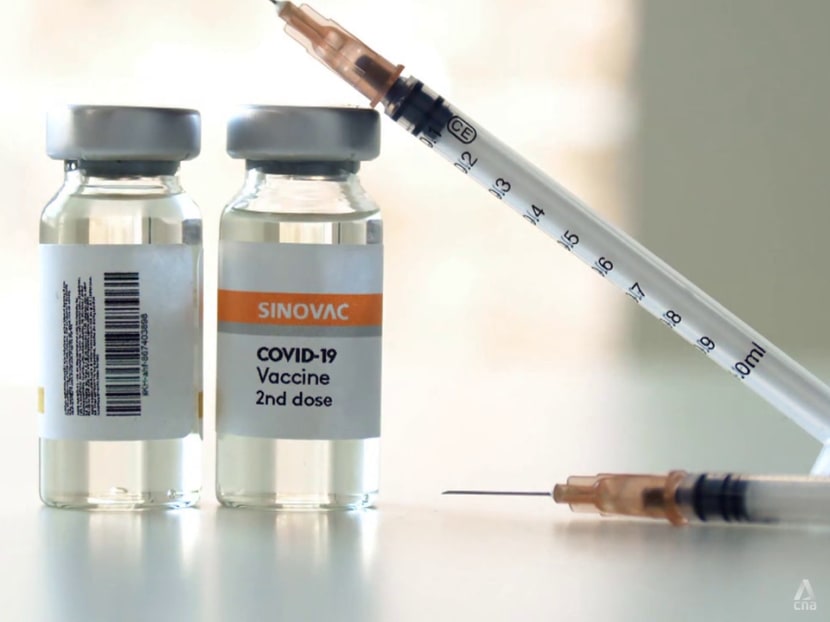Vaccinated people accounted for 30% of COVID-19 deaths last year: Ong Ye Kung

SINGAPORE: Fully vaccinated individuals accounted for 30 per cent of Singapore's COVID-19 deaths last year, said Health Minister Ong Ye Kung on Monday (Jan 10).
Of the 802 COVID-19 deaths in Singapore last year, 247 were fully vaccinated.
Most of the vaccinated individuals who died from COVID-19 had received non-mRNA vaccines, according to crude incidence rates of deaths provided by Mr Ong.
Speaking in Parliament, Mr Ong provided the crude incidence rates based on type of vaccination: 11 deaths per 100,000 for those vaccinated with Sinovac, 7.8 per 100,000 for Sinopharm, 6.2 per 100,000 for Pfizer-BioNTech, and 1 per 100,000 for Moderna.
"Be mindful we are calculating this based on quite a small sample of 247 deaths ... These rates are only indicative since they do not account for other factors which can affect mortality such as the age and timing of vaccination," said Mr Ong.
Related:
CONVINCING THE MEDICALLY ELIGIBLE
The remaining 555 people who died from COVID-19 last year were not fully vaccinated.
Although the unvaccinated represents a "small proportion" of Singapore's population, those deaths accounted for 70 per cent of the total COVID-19 deaths last year, added Mr Ong.
Currently, around 132,000 people aged 18 and above remain unvaccinated, while there are around 300 people who are medically ineligible, said Mr Ong.
"We will continue to try to convince those who are medically eligible to get vaccinated, through their primary care physicians, public messaging and the media. But as the number gets smaller, it is also harder to convince them."
MOH has managed to vaccinate "well over 90 per cent" of every eligible age group over the past months, he added.
"We are especially happy to see that amongst seniors aged 60 to 69, and 70 and above, 96 per cent and 95 per cent have been fully vaccinated respectively."
As for those aged 12 to 19 years old, 95 per cent are fully vaccinated, said Mr Ong, while response has been "good" and operations have been "smooth" for vaccinations among younger children aged five to 11.
"At this time, only the Pfizer-BioNTech/Comirnaty vaccine is authorised for use in ages below 18 years. We will continue to monitor closely the availability of other vaccines, including non-mRNA vaccines that are approved for use in children," added Mr Ong.
BOOSTER PROGRAMME GATHERING PACE
Singapore's booster programme is "gathering pace", with about 46 per cent of the population having received their boosters, said Mr Ong.
"We have recently brought some 900,000 individuals aged 18 to 29 into the booster programme, of whom 700,000 are already eligible to receive their boosters today."
Mr Ong added that booster coverage will continue to expand over the month of January. MOH has also set a validity period for full vaccination status of 270 days, to send "a strong signal to our population".
However, it is "still too early to tell" whether there is a need for further booster shots, he said. Israel is the only country that has authorised a fourth dose for non-immunocompromised individuals.
Mr Ong also drew reference from influenza, which is an endemic infectious disease, about how Singapore can learn to live with COVID-19.
"The (influenza) virus mutates frequently, so people receive vaccinations every year to protect themselves against it, without many problems, or the need for disruptive border closures and social restrictions each time there is an influenza infection wave," he said.
"It is a possible future scenario when we live with COVID-19 as an endemic disease."
BOOKMARK THIS: Our comprehensive coverage of the COVID-19 pandemic and its developments
Download our app or subscribe to our Telegram channel for the latest updates on the coronavirus pandemic: https://cna.asia/telegram









